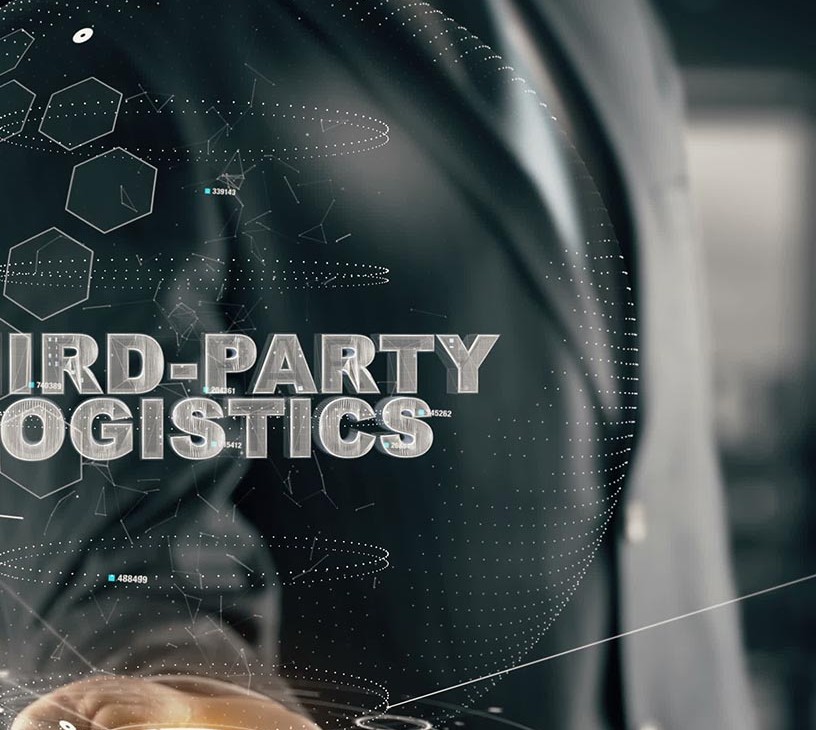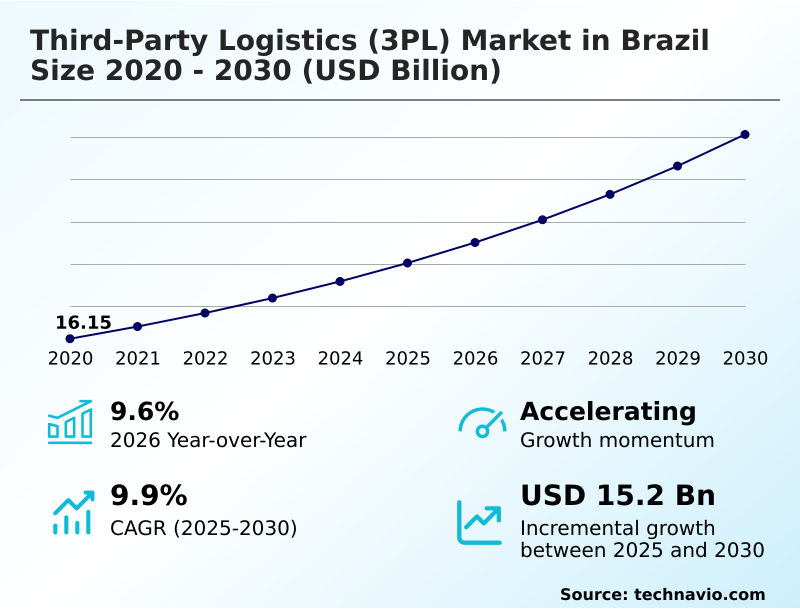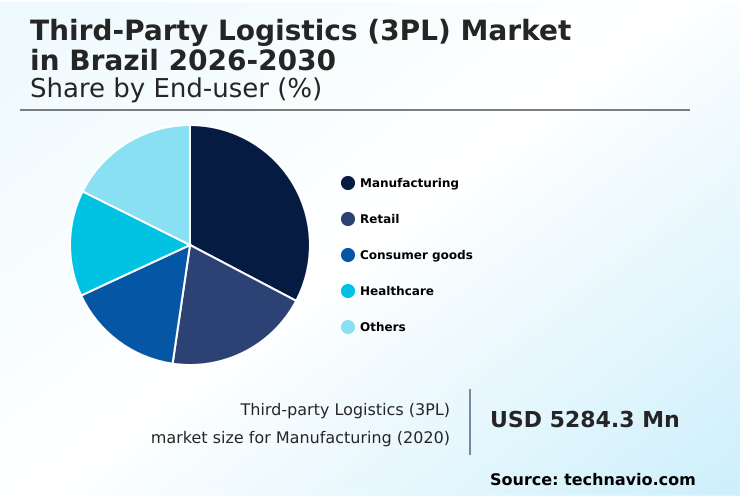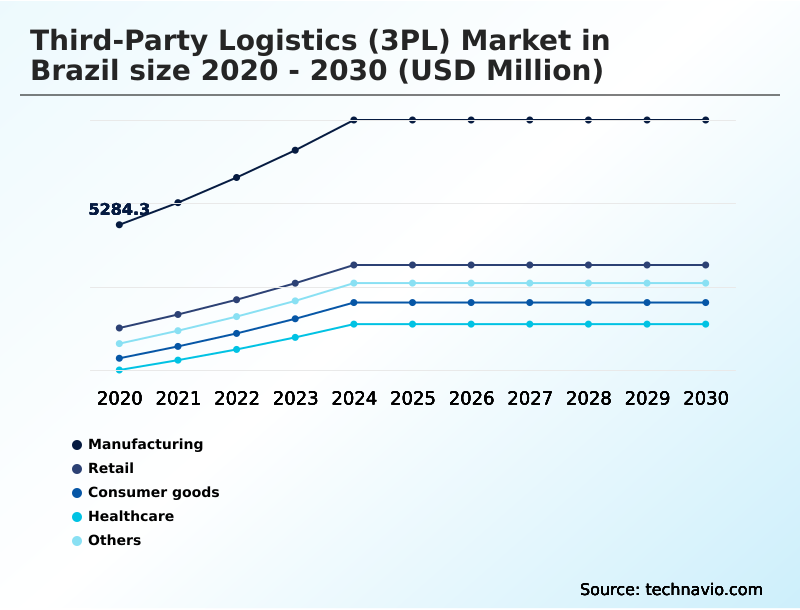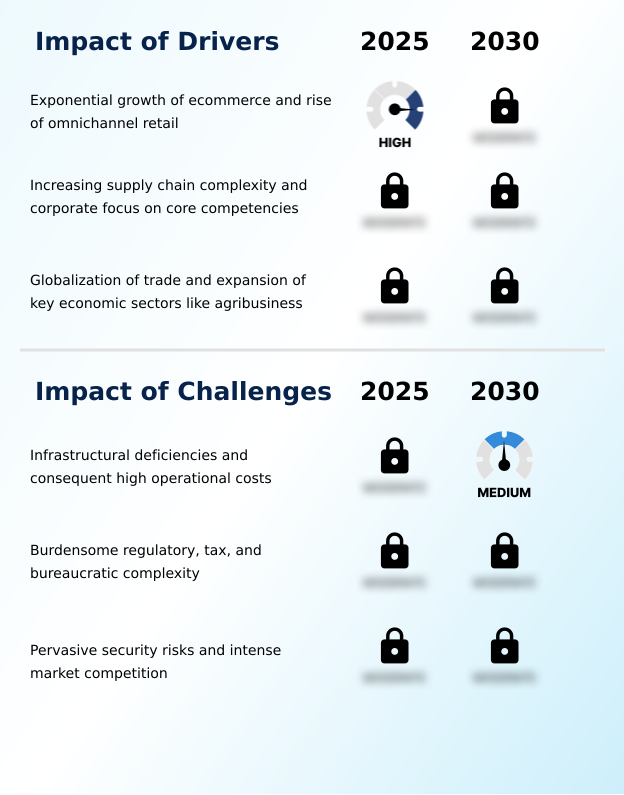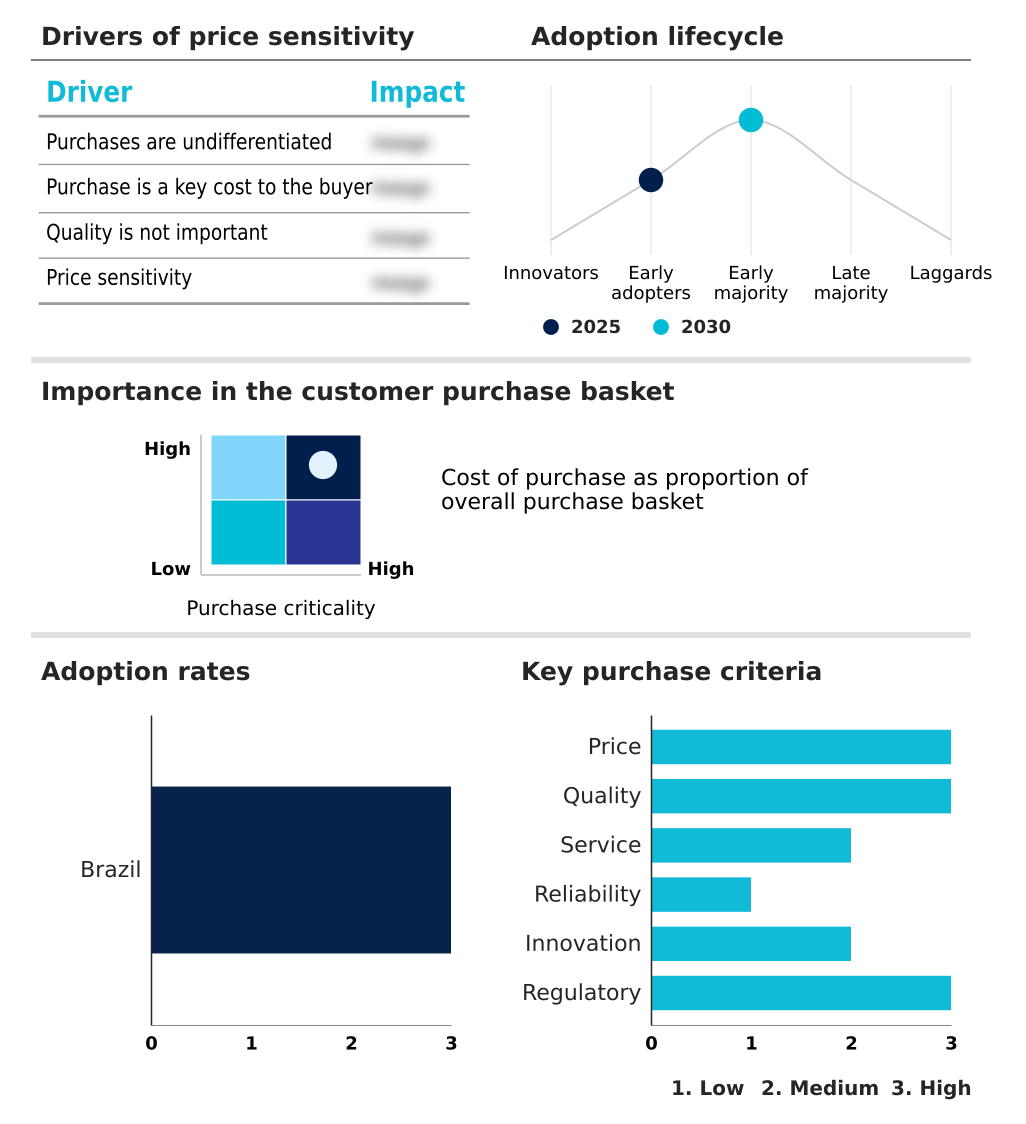Brazil Third-party Logistics (3PL) Market Size 2026-2030
The brazil third-party logistics (3pl) market size is valued to increase by USD 15.20 billion, at a CAGR of 9.9% from 2025 to 2030. Exponential growth of ecommerce and rise of omnichannel retail will drive the brazil third-party logistics (3pl) market.
Major Market Trends & Insights
- By End-user - Manufacturing segment was valued at USD 7.43 billion in 2024
- By Service - Transportation segment accounted for the largest market revenue share in 2024
Market Size & Forecast
- Market Opportunities: USD 24.14 billion
- Market Future Opportunities: USD 15.20 billion
- CAGR from 2025 to 2030 : 9.9%
Market Summary
- The Third-Party Logistics (3PL) Market in Brazil is undergoing significant expansion, driven by structural economic shifts and strategic investments. Increasing supply chain complexity and consumer demands for faster delivery compel businesses to seek specialized expertise, making outsourcing a critical strategy. This trend is reinforced by a dynamic market where providers leverage technology to offer end-to-end solutions.
- The expansion of e-commerce is a powerful catalyst, creating immense pressure for robust warehousing, efficient inventory management, and agile last-mile delivery services. For instance, a retail company can partner with a 3PL to manage its entire omnichannel fulfillment process, from pick-and-pack operations in a shared facility to handling customer returns via an efficient reverse logistics network.
- This allows the retailer to scale for seasonal peaks without massive capital investment in infrastructure. Challenges such as infrastructural deficits and regulatory hurdles are being met with innovation in route optimization and greater supply chain visibility, turning logistical proficiency into a key competitive differentiator. These providers offer critical value-added services, including contract logistics and freight forwarding.
What will be the Size of the Brazil Third-party Logistics (3PL) Market during the forecast period?
Get Key Insights on Market Forecast (PDF) Request Free Sample
How is the Brazil Third-party Logistics (3PL) Market Segmented?
The brazil third-party logistics (3pl) industry research report provides comprehensive data (region-wise segment analysis), with forecasts and estimates in "USD million" for the period 2026-2030, as well as historical data from 2020-2024 for the following segments.
- End-user
- Manufacturing
- Retail
- Consumer goods
- Healthcare
- Others
- Service
- Transportation
- Warehousing and distribution
- Mode of transportation
- Roadways
- Waterways
- Railways
- Airways
- Geography
- South America
- Brazil
- South America
By End-user Insights
The manufacturing segment is estimated to witness significant growth during the forecast period.
The manufacturing segment presents multifaceted supply chain requirements, relying on external providers for comprehensive services across the production lifecycle.
Critical functions include inbound logistics, managing synchronized delivery of components for just-in-time delivery models, which can improve production line efficiency by over 15%. This necessitates expert procurement logistics and freight brokerage.
Providers manage outbound logistics for finished goods, utilizing complex distribution networks. This requires advanced logistics network design for efficient interstate transportation. Value-added services such as kitting and sub-assembly are also frequently outsourced.
The partnership is strategic, focusing on enhancing operational efficiency, improving supply chain visibility through real-time tracking, and enabling just-in-sequence logistics for the automotive supply chain, thereby increasing overall supply chain resilience.
The Manufacturing segment was valued at USD 7.43 billion in 2024 and showed a gradual increase during the forecast period.
Market Dynamics
Our researchers analyzed the data with 2025 as the base year, along with the key drivers, trends, and challenges. A holistic analysis of drivers will help companies refine their marketing strategies to gain a competitive advantage.
- Strategic decision-making in the logistics sector increasingly revolves around balancing cost and service. An analysis of optimizing ftl vs ltl shipping decisions and the potential for cost of last-mile delivery reduction are central to boardroom discussions. The benefits of outsourcing warehouse management are clear, as it allows companies to focus on core competencies while specialists handle complex operations.
- For e-commerce firms, the ability in managing reverse logistics for ecommerce efficiently is no longer a secondary concern but a primary driver of customer satisfaction. The business case for technology adoption is compelling, with the implementing transportation management system roi often realized through direct gains in efficiency and the strategic value of improving supply chain visibility technology.
- This is especially true when reducing logistics costs with tms, which can yield savings significantly higher than manual planning methods. The role of 3pl in manufacturing sector has evolved to include intricate just-in-time systems, while the 3pl contract logistics for retail sector focuses on omnichannel agility.
- Specialized verticals also present unique hurdles, including the challenges in pharmaceutical cold chain logistics and the need for 3pl solutions for healthcare industry. For exporters, leveraging intermodal transport for agribusiness exports and skillfully navigating customs with freight forwarders are critical.
- Operationally, the move toward warehouse automation for order fulfillment, which includes automating pick and pack process benefits, is driven by the need for speed and accuracy. This is complemented by the deployment of technology for real-time shipment tracking and stringent security protocols for high-value cargo.
- Finally, providers are focusing on sustainability in 3pl transportation fleets and creating tailored solutions for managing logistics in omnichannel retail and the third-party logistics for consumer goods segment.
What are the key market drivers leading to the rise in the adoption of Brazil Third-party Logistics (3PL) Industry?
- The exponential growth of e-commerce, coupled with the broad adoption of omnichannel retail strategies, serves as a primary driver for market expansion and increasing logistical complexity.
- The exponential growth of e-commerce is a paramount driver, creating immense pressure for robust omnichannel fulfillment and agile last-mile logistics. This shift demands specialized capabilities in direct-to-consumer fulfillment and efficient parcel management.
- Businesses are increasingly outsourcing to focus on core competencies, leveraging 3pl for ecommerce to convert fixed costs into variable ones, which can reduce capital lock-up by 30%.
- This strategic move is also a response to increasing operational complexity and the need for logistics process automation.
- Furthermore, the country's integration into the global economy fuels demand for sophisticated freight forwarding and multimodal freight solutions to support key export sectors.
- This partnership model transforms the supply chain from a cost center into a strategic enabler, improving operational excellence through supply chain consulting and managed transportation services.
What are the market trends shaping the Brazil Third-party Logistics (3PL) Industry?
- An accelerated pace of digital transformation is fundamentally reshaping operational models. This widespread technology adoption is increasingly becoming a core competitive differentiator for service providers.
- A defining trend is the accelerated pace of digital transformation, where providers are becoming technology-led integrators. This involves modernizing fulfillment centers with robotic process automation in warehousing to boost productivity by over 20%. The use of data analytics, ai for demand forecasting, and predictive analytics for logistics is becoming a core competency for dynamic route optimization and asset utilization.
- Another crucial facet is the push for end-to-end supply chain management, where logistics control tower solutions provide a unified view. Concurrently, a growing emphasis on sustainability is driving green logistics and sustainable logistics practices, influencing fleet modernization and promoting a modal shift to more eco-friendly transport, a key factor in agribusiness logistics and high-value goods transport.
What challenges does the Brazil Third-party Logistics (3PL) Industry face during its growth?
- Significant infrastructural deficiencies and the resulting high operational costs present a primary challenge to the industry's growth, profitability, and overall efficiency.
- A primary challenge is the profound infrastructural deficit, which translates into high operational costs and makes effective logistics cost management a constant struggle. The overwhelming dependence on roadways with poor surface quality leads to longer transit times and inflates maintenance budgets by up to 25%.
- Additionally, the burdensome regulatory environment, particularly the complexities of brazilian tax compliance in logistics, imposes significant administrative weight. Pervasive cargo security solutions are non-negotiable due to high theft rates, adding substantial expense. This difficult situation is exacerbated by intense competition, which fosters debilitating price wars and margin squeeze, particularly in commoditized services like standard full truckload and less-than-truckload transport.
- Navigating these challenges requires significant investment in technology and expertise in hazardous materials logistics and pharmaceutical logistics.
Exclusive Technavio Analysis on Customer Landscape
The brazil third-party logistics (3pl) market forecasting report includes the adoption lifecycle of the market, covering from the innovator’s stage to the laggard’s stage. It focuses on adoption rates in different regions based on penetration. Furthermore, the brazil third-party logistics (3pl) market report also includes key purchase criteria and drivers of price sensitivity to help companies evaluate and develop their market growth analysis strategies.
Customer Landscape of Brazil Third-party Logistics (3PL) Industry
Competitive Landscape
Companies are implementing various strategies, such as strategic alliances, brazil third-party logistics (3pl) market forecast, partnerships, mergers and acquisitions, geographical expansion, and product/service launches, to enhance their presence in the industry.
AP Moller Maersk AS - Specializing in integrated third-party logistics, the firm delivers comprehensive transportation, warehousing, and distribution solutions tailored for complex and demanding supply chain environments.
The industry research and growth report includes detailed analyses of the competitive landscape of the market and information about key companies, including:
- AP Moller Maersk AS
- BBM Logistica
- C H Robinson Worldwide Inc.
- CEVA Logistics SA
- CMA CGM Group
- Deutsche Post AG
- DSV AS
- FedEx Corp.
- FEMSA
- GEODIS
- Kerry Logistics Network Ltd.
- Kintetsu World Express Inc.
- Kuehne Nagel Management AG
- Nippon Express Holdings Inc.
- Penske Corp.
- Schenker AG
- United Parcel Service Inc.
Qualitative and quantitative analysis of companies has been conducted to help clients understand the wider business environment as well as the strengths and weaknesses of key industry players. Data is qualitatively analyzed to categorize companies as pure play, category-focused, industry-focused, and diversified; it is quantitatively analyzed to categorize companies as dominant, leading, strong, tentative, and weak.
Recent Development and News in Brazil third-party logistics (3pl) market
- In August, 2024, Log-In Logistica Intermodal announced the charter of an additional container ship to expand its service capacity, aiming to increase the frequency of its cabotage routes connecting the Port of Manaus with key ports in the southeast.
- In September, 2024, a BTG Pactual investment fund acquired a substantial portfolio of logistics assets, including multiple warehouses, from GLP Partners Group to enhance its capabilities for the growing e-commerce and retail sectors.
- In September, 2024, LATAM Cargo inaugurated a new direct freighter service between Miami and Florianopolis, specifically established to serve the burgeoning technology sector in the state of Santa Catarina with a more efficient logistics corridor.
- In October, 2024, GLP Capital Partners completed the sale of a portfolio of thirteen logistics assets to a real estate investment trust managed by BTG Pactual, highlighting strong investor confidence in properties near major consumption hubs like Sao Paulo.
Dive into Technavio’s robust research methodology, blending expert interviews, extensive data synthesis, and validated models for unparalleled Brazil Third-party Logistics (3PL) Market insights. See full methodology.
| Market Scope | |
|---|---|
| Page number | 192 |
| Base year | 2025 |
| Historic period | 2020-2024 |
| Forecast period | 2026-2030 |
| Growth momentum & CAGR | Accelerate at a CAGR of 9.9% |
| Market growth 2026-2030 | USD 15198.5 million |
| Market structure | Fragmented |
| YoY growth 2025-2026(%) | 9.6% |
| Key countries | Brazil |
| Competitive landscape | Leading Companies, Market Positioning of Companies, Competitive Strategies, and Industry Risks |
Research Analyst Overview
- The market is defined by a complex interplay of services designed to enhance supply chain optimization. Core offerings range from managing full truckload and less-than-truckload shipments to sophisticated contract logistics. A critical boardroom decision involves investing in technology to achieve end-to-end supply chain visibility, as firms using integrated platforms report a 25% improvement in forecast accuracy.
- This is enabled by a robust transportation management system for route optimization and a warehouse management system for precise inventory management. The rise of e-commerce has made omnichannel fulfillment, order fulfillment, and parcel management central to strategy, with last-mile delivery and last-mile logistics being key differentiators.
- Specialized services are also growing, including cold chain logistics for perishables, managed through expert freight forwarding and stringent customs clearance. Operations like cross-docking, pick-and-pack operations, and efficient drayage services improve asset utilization. Providers are also acting as a lead logistics partner, overseeing everything from inbound logistics and procurement logistics to outbound logistics, including interstate transportation and intermodal transportation.
- Strategic goals include promoting a modal shift, advancing green logistics, and ensuring just-in-time delivery, with real-time tracking and efficient reverse logistics becoming standard expectations. Expertise in freight brokerage and offering diverse value-added services are essential for navigating this competitive landscape and refining logistics network design.
What are the Key Data Covered in this Brazil Third-party Logistics (3PL) Market Research and Growth Report?
-
What is the expected growth of the Brazil Third-party Logistics (3PL) Market between 2026 and 2030?
-
USD 15.20 billion, at a CAGR of 9.9%
-
-
What segmentation does the market report cover?
-
The report is segmented by End-user (Manufacturing, Retail, Consumer goods, Healthcare, and Others), Service (Transportation, and Warehousing and distribution), Mode of Transportation (Roadways, Waterways, Railways, and Airways) and Geography (South America)
-
-
Which regions are analyzed in the report?
-
South America
-
-
What are the key growth drivers and market challenges?
-
Exponential growth of ecommerce and rise of omnichannel retail, Infrastructural deficiencies and consequent high operational costs
-
-
Who are the major players in the Brazil Third-party Logistics (3PL) Market?
-
AP Moller Maersk AS, BBM Logistica, C H Robinson Worldwide Inc., CEVA Logistics SA, CMA CGM Group, Deutsche Post AG, DSV AS, FedEx Corp., FEMSA, GEODIS, Kerry Logistics Network Ltd., Kintetsu World Express Inc., Kuehne Nagel Management AG, Nippon Express Holdings Inc., Penske Corp., Schenker AG and United Parcel Service Inc.
-
Market Research Insights
- Market dynamics are heavily influenced by the strategic imperative for businesses to focus on core competencies while navigating an increasingly complex operating environment. The shift toward outsourcing allows companies to leverage specialized supply chain consulting and managed transportation services, which can reduce overall logistics costs by up to 20%.
- The rise of digital commerce necessitates sophisticated omnichannel retail logistics and capabilities in direct-to-consumer fulfillment. Providers offering dedicated contract carriage and end-to-end supply chain management are gaining traction by providing higher levels of service and reliability. Adopting logistics process automation has been shown to improve order accuracy by over 99.5%, a critical metric in high-volume sectors.
- This transforms logistics from a cost center into a strategic enabler of business objectives.
We can help! Our analysts can customize this brazil third-party logistics (3pl) market research report to meet your requirements.
